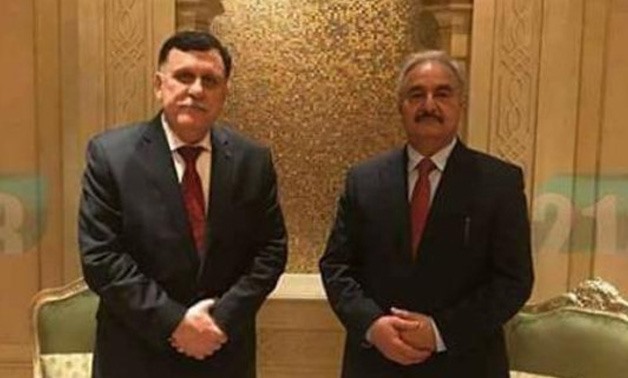
Libyan leaders fayez al sarraj and Khalifa Haftar_ Wikimedia
CAIRO – 3 May 2017: A pivotal meeting took place between Libyan leaders that marked the first time the aforesaid leaders assembled together to achieve a truce in order to redirect their efforts to stabilizing the conflict-ridden country.
The meeting included Mohammed bin Zayed Al-Nahyan (Crown Prince of Abu Dhabi), Fayez al-Sarraj (Head of the U.N.-backed Libyan Government of National Accord), and Khalifa Haftar (Commander of the Eastern “Operation Dignity” forces).
The meeting between Haftar and al-Sarraj resulted in a preliminary agreement between the two major rivals to end the armed conflict that had lasted for several years. The Libyan leaders agreed to form a unified presidential council where the commander of the army and the heads of both the Libyan government and the House of Representatives would be members.
A joint statement was issued on Wednesday outlining the main principles of the agreement. It called for achieving the unity of Libyan territory and the army, confronting terrorist groups, and the adherence to the rule of law and the judiciary.
“The unification of the Libyan army and dissolution of all militants groups would be the main purpose of the agreement,” said Abu Bakr El-Saeed, member of the Libyan House of Representatives.
He pointed out that a unified national army will secure the Libyan borders and limit illegal immigration and smuggling of arms and drugs which threaten national security of neighboring countries.
During the Abu Dhabi meeting, al-Sarraj and Haftar discussed the obstacles that had prevented the implementation of the previous political agreement signed in December 2015. The meeting also dealt with the possible ways to lift the embargo imposed on the Libyan armed forces led by Haftar.
According to media reports, parliamentary elections will be held within six months after the agreement comes into force.
El-Saeed, however, ruled out holding parliamentary or presidential elections in the near future due to the general instability. He told Egypt Today that the planned presidential council will initially form a unity government representing all Libyan national forces and then will formulate a new constitution for the country.
The Libyan revolution preceded the rise of regime military members who joined rebel forces such as the Islamist Shura Council of Benghazi Revolutionaries, led by Ansar al-Sharia (Libya), and the Islamist coalition known as "Libya Dawn" and other militias.
Field Marshal Haftar controls the eastern side of Libya and works in cooperation with the government of the House of Representatives, known as the "Tobruk government."
El-Saeed asserted that the Libyan national army would welcome other Libyan armed groups which are willing to surrender their weapons and join the regular army; otherwise they will be classified as illegal groups.
In a press statement to AFP, Mattia Toaldo, Senior Policy Fellow at the European Council on Foreign Relations, said the Abu Dhabi meeting constitutes a change of tack by Haftar who is courting the presidential office next year.
On the other hand, El-Saeed believes that all Libyan political forces should now focus on achieving stability and the talk about holding presidential election is premature.
Libya has been locked in conflict since the revolution which overthrew long-time leader Muammar Gaddafi in 2011.
The civil war has witnessed the emergence of numerous armed groups, forcing several countries to summon back their expatriates and diplomats.
According to a report issued by the U.N. Support Mission in Libya, 26 people were killed and two others injured in operations in all Libyan cities in April alone. Among the victims were 23 civilians, including a woman and two children.
Comments
Leave a Comment